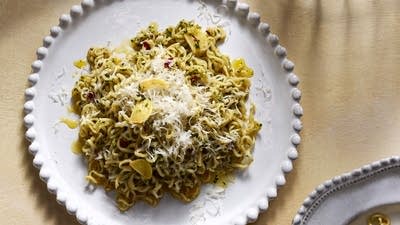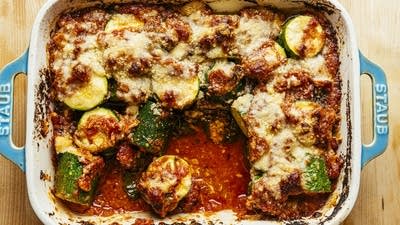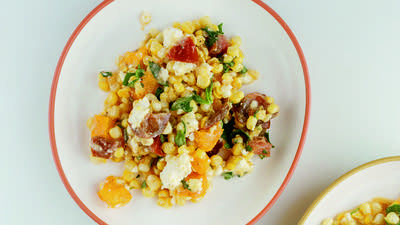
It was a cold Thanksgiving weekend in 2008 when the food truck Kogi BBQ was launched in Los Angeles. Behind its wheel was rebel chef Roy Choi. Choi was trained in fine dining, but restless to feed the city that he loved with a more democratic approach. His Korean tacos were priced at $2 each.
In a few months, his truck became an icon of the L.A. street scene. He went on to pick up Food & Wine's Best New Chef Award in 2010, and has written a memoir, L.A. Son.
Jennifer 8 Lee: I love Korean food. I grew up a Chinese-American in New York City, and my family ate Korean food for Thanksgiving because that was our special meal. I always couldn't understand why it took so long to break into the mainstream. Why do you think you were able to do that? Were Korean tacos the way that Korean food had to break in? Your parents ran a Korean restaurant, but at that time it was mostly Korean clientele, correct?
 L.A. Son
L.A. Son
Roy Choi: Correct. It's weird because the Kogi taco really never represented Korean food; it represented L.A. But through that gateway, somehow it came back to Korea.
As far as why Korean food took a while, I think there are two parts. One, maybe the Koreans didn't want it to blow up? On the real: We're a hermit culture. We're kind of private in what we do. We really didn’t care whether the mainstream liked our food or not. Most of the menus were written in Korean; none of them were written in English. It really didn't register in our families' brains.
The other part is that the Korean meal is not a linear meal; it's not like you start at one point and you end at the other. The Western way of eating is always appetizers, starter salad, main course and then dessert. You start at A and you end at Z.
A Korean meal comes from all points at the same time, and it's not on one plate. I think it was very hard to try to take all of that and put it into a linear form. Maybe the streets helped that.
J8L: What I always thought was interesting about Korean cuisine was, unlike Chinese food and parts of Japanese food, which really catered to the American palate, Korean food held its ground. It was, like you said, what it was meant to be.
It's interesting to see how much a phenomenon Korean tacos have become -- not just in L.A. where you started, but across the country. Why do you think it caught fire so quickly?
 Choi's recipe: Beef Cheek Tacos
Choi's recipe: Beef Cheek Tacos
RC: The food part is because I believe it was delicious. But nobody can hate on a taco, so that right there was already a vessel that made people look, care and take a chance. That's one, on the food level.
On the other level, we combine Twitter with food; it was the first time that food had a viral voice.
We had a personality behind it. We were out there. We had the same fundamental principles as any chef-driven kitchen. Our attitude, our demeanor and our voice were different, but then when you looked beyond the technology and the voice, you saw organization, cleanliness. You saw hard work ethics and honesty in food. All of that together created a groundswell for sure.
Then the fact that we were mobile -- that we could go out to people. The voice was young, so we hit a whole new generation, made a bridge for people to connect with food.
 Kogi BBQ
Photo: Daremoshiranai / Flickr
Kogi BBQ
Photo: Daremoshiranai / Flickr
J8L: Before you started the Korean barbecue track, your entire background is a mix of highs and lows. Tell me a little bit about all the lines that brought you to Kogi.
RC: There were many [Korean immigrants] who came through Hawaii and some parts of the mainland in the early 1900s. The main wave came in the late '60s and the early '70s. For that first wave, most of them were educated. But they came, and if you weren't studying science -- even if you had a Ph.D. in history -- nobody was giving you a job. You couldn't get a job. Long story short: We became merchants.
You had all these educated people who ended up owning liquor stores, gas stations, dry cleaners and all that stuff. My parents were the same. They came in, opened a liquor store in K-Town, and then our life kind of built from there. Their whole dream was just to continue to thrive and move up. Many different businesses, from liquor stores to restaurants to jewelry stores -- some failed, some succeeded -- all they cared about was their children.
J8L: How do you think that shaped your culinary path?
RC: It shaped everything because food was always there. They always seemed to find the money or the time to have great food on the table.
Then, growing up in a restaurant from third to seventh grade was a big deal. It was crazy because it was like being in an environment that was alive all the time.
J8L: Your mom made great kimchi; it drew a lot of people.
 Choi's recipe: Cardamom Milk Shaved Ice
Choi's recipe: Cardamom Milk Shaved Ice
RC: Before the restaurant, going back to the immigration, it was about the hustle. Any immigrant who comes to this country has their own story of hustle. Because in most cases, you come here with no money in your pocket. It doesn't matter who you were; it matters who you become.
My mom was cooking all the time. She was packing kimchis, banchans and dried fish. Then we put them in cardboard boxes, put them in the trunk, and she would just literally go door to door and sell them, trying to find all the Korean families.
A reputation built from that. When we went to a party, she would bring all the food. My mom is gangster like that. She doesn't ask permission. She'll show up at the party with a trunkload of food, and she wasn't supposed to show up with a trunkload of food. You've got to feel me on that. So she'll show up, the party is going on, and then she'll pull out all this kimchi. It becomes like an Amway sale, but it's kimchi instead. That definitely built her rep, and then it led to a restaurant.
J8L: How do your parents feel about all your success since then?
RC: I'm sure they are very proud and happy. I'm happy and proud for them. They are still needling me as parents. "Why don't you do this? Why aren't you in New York?" If I am on Time, "Why aren't you on CNN?" If you are on CNN, "Why aren't you on this?" If you are on public radio, "Why aren't you on that?" At some point, I had to be at peace with all that.
Before you go...
Each week, The Splendid Table brings you stories that expand your world view, inspire you to try something new, and show how food connects us all. We rely on your generous support. For as little as $5 a month, you can have a lasting impact on The Splendid Table. And, when you donate, you’ll join a community of like-minded individuals who love good food, good conversation, and kitchen companionship. Show your love for The Splendid Table with a gift today.
Thank you for your support.
Donate today for as little as $5.00 a month. Your gift only takes a few minutes and has a lasting impact on The Splendid Table and you'll be welcomed into The Splendid Table Co-op.




